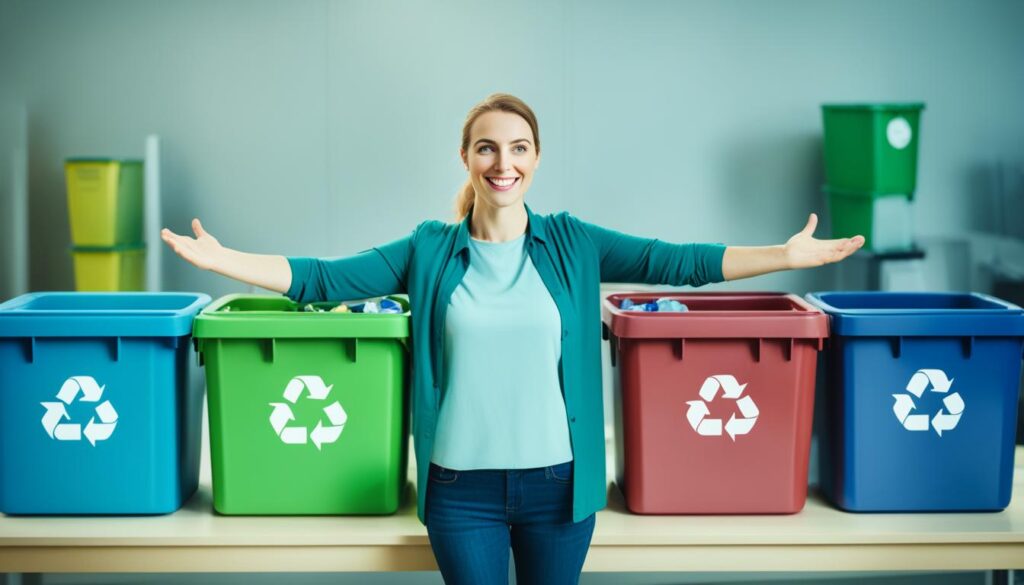I used to think a lot about the future of the planet, but I didn’t take action. One day, I decided to change that. I started to see how my consumption habits were affecting the environment.
Today, there are nearly 8 billion people in the world. Scientists and activists warn: we need to consume better. Implementing responsible consumption is easy and important.
Key Learnings
- Conscious consumption considers personal satisfaction, environmental impacts, and the social effects of our choices.
- Adopting sustainable habits, such as separating waste and saving water, makes a difference.
- Avoiding food waste and choosing organic products also helps.
- Reducing plastics, reusing and donating items, and encouraging recycling are good practices.
- Environmental education is key to a culture of responsible consumption.
- Small changes in our daily routines can make a big difference for the environment and society.
Reducing Environmental Impact in Daily Life
Conscious consumption is very important for reducing our environmental impact. It helps build a sustainable future. Considering the balance between our satisfaction, the environment, and the effects of our choices is fundamental.
A Nielsen survey showed that 42% of Brazilian consumers are changing their habits to help the environment. This shows that many people are becoming more aware of the importance of a sustainable lifestyle.
However, only 20% of Brazilians see themselves as eco-friendly consumers. This indicates that there is still much to be done to achieve sustainable development in the country. The main challenges include the high price of eco-friendly products and the lack of information about the effects of consumption.
Despite the challenges, it is crucial that everyone does their part to reduce their ecological footprint. Small changes in our routines can make a big difference for the environment.
Implementing Responsible Consumption: Sustainable Habits
To adopt responsible consumption, some sustainable habits are essential. Proper waste separation for recycling is one example. It is also important to save water and energy. These actions, although simple, have a significant positive impact on the environment.
Avoiding food waste and opting for organic products are important practices. They help to save natural resources and reduce waste generation. Thus, we promote a more sustainable lifestyle.
Proper Waste Separation
Proper waste separation is crucial for recycling and waste reduction. It is important to separate materials into categories such as recyclables, organic waste, and non-recyclables. This facilitates the processing and proper disposal of each material.

Water and Energy Conservation
It is essential to conserve water and energy in daily life. Simple actions, such as taking shorter showers and turning off unnecessary lights, are important. They help to preserve natural resources.
“According to FAO (Food and Agriculture Organization of the United Nations), the world has lost an area of forest greater than two São Paulo States in the last decade.”
These responsible consumption practices reduce the extraction of natural resources and pollution generation. They benefit the environment in the long term.
Waste Reduction and Resource Reuse
Reducing waste and reusing resources are key to responsible consumption. This includes choosing reduced or reusable packaging, reusing items that are no longer needed, and recycling materials. These practices create a more sustainable lifecycle, reducing the need for new resources and waste.
Here are some statistics that highlight the importance of this:
- About 30% of the food produced in the world is lost before it is consumed.
- Nearly one billion people are hungry, and one-third of the food produced is thrown away.
- Recycling 100 tons of plastic saves one ton of oil. Recycling paper saves 10,000 liters of water.
Source reduction helps to lower costs and meets the National Solid Waste Policy. It also saves energy and materials. Reusing inputs reduces the exploitation of natural resources and minimizes waste and industrial processes.
Recycling turns waste into new materials, reducing environmental impact. It creates jobs and reduces the use of natural resources. Therefore, practices such as Waste Reduction, Resource Reuse, and Circular Economy are crucial for sustainable consumption.
Conscious Consumption Practices in Daily Life
In daily life, it is important to adopt responsible consumption practices. This goes beyond separating waste and saving resources. Habits such as buying only what is necessary and avoiding impulse purchases are essential.
It is good to prefer products with sustainable packaging. Additionally, reusing or donating items that we no longer use helps to reduce waste. These actions direct resources in a sustainable way.
Conscious Purchasing and Sustainable Packaging
A survey by SPC Brazil showed that only 4% of Brazilians have a high level of conscious consumption. They adopt 11 to 13 sustainable behaviors. Another 20% are considered engaged, with 8 to 10 practices.
It is recommended to opt for reduced or reusable packaging. About one-third of household waste comes from packaging, and 80% is discarded after the first use. Choosing sustainable packaging helps to reduce environmental impact.
Reuse and Donation
Reusing or donating items that we no longer use is a responsible habit. It is a way to avoid waste and give new life to items that can still be useful. Consider donating clothes, toys, or household items that are still in good condition.
Final Considerations
Adopting a responsible consumption lifestyle is essential for building a sustainable future. Simple actions, such as reducing waste, reusing resources, and making conscious purchases, contribute to a better environment for future generations.
